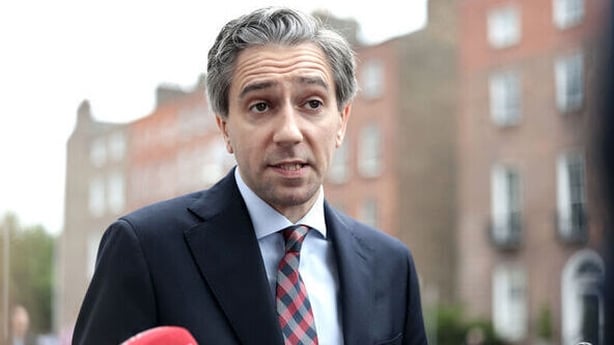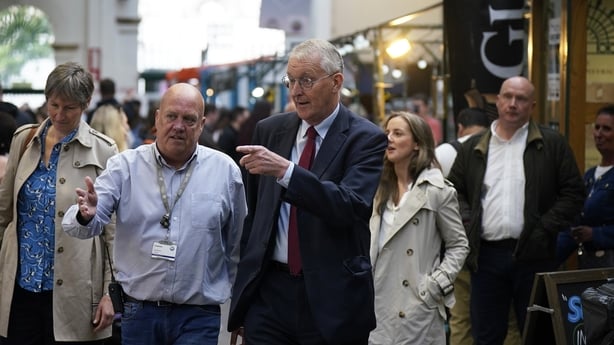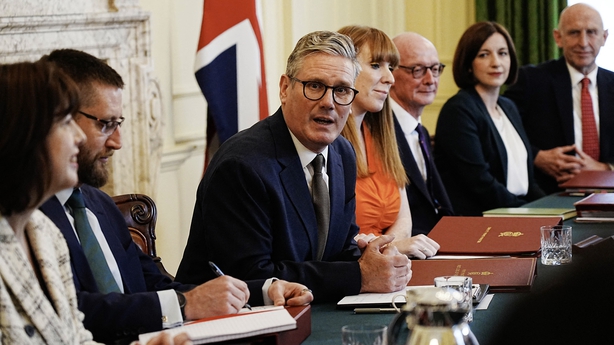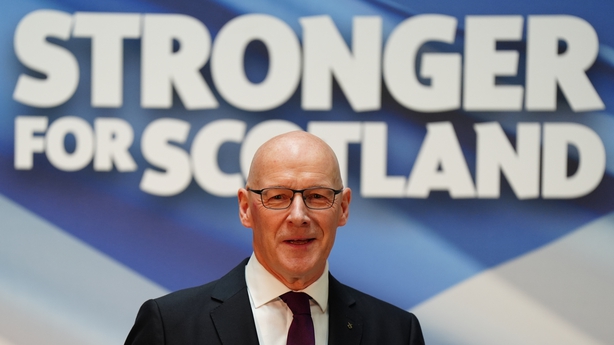Northern Ireland's Secretary of State Hilary Benn has pledged to work with the Government on a new approach to dealing with the legacy of the Troubles.
In his first visit to the region since taking up office, Mr Benn set out his stall which has made resetting British - Irish relations, severely strained in recent years, a key priority.
This includes replacing the Conservative's controversial Legacy Act, which is opposed by all of Northern Ireland's main parties and is being challenged by the Irish Government in the European Court of Human Rights.
The Taoiseach welcomed the new British government's intention to scrap the Legacy Act.
However, Mr Harris declined to say if Ireland will now drop its case against the UK, adding that things must be taken step by step.

Ahead of the election, the Labour Party pledged to repeal the Legacy Act introduced by the Tories.
The Legacy Act, which came into effect on 1 May, caused a huge rift between London and Dublin with the Irish Government taking a case against the UK in the European Court of Human Rights.
The legislation ended all criminal investigations, inquests and civil court actions in relation to Troubles killings.
Speaking on Sky News, Mr Harris said that Prime Minister Keir Starmer had "given a very clear commitment in relation to legacy".
Mr Harris said: "I'm giving a very clear indication back that we're happy to work with the British government on legacy.
"Legacy is so important and it has to be victim-centred, it has to be human rights based, and it has to provide answers and justice for people who've experienced terrible atrocities.
"And we also have to listen to the parties in Northern Ireland in relation to getting this right."
The Taoiseach said that there will be a "fair hearing" to any British proposals and a willingness to listen.
He reiterated his hopes to reset the British-Irish relationship, saying the next generation would "never forgive us" if this opportunity was not seized.
The Taoiseach also promised that Ireland will be an ally for the UK within the European Union.
Budget pressures
Meanwhile, Mr Benn said the Stormont power-sharing executive will have to look at raising its own revenue to help deal with public sector budget pressures.
During a visit to St George's Market in Belfast, he said Stormont has historically "not been as good as it might be in income generation".
He said that a priority had to be given to ensuring that the current budget was being used in the most effective way.
Speaking to the media, Mr Benn pointed out that public spending in Northern Ireland is higher than in England.
The region receives about £124 (€146) per head for every £100 per head spent in England.

Mr Benn said: "Those (funding) discussions about the future will continue and there will be additional money when the main estimates are published which I anticipate will be in the near future.
"But I would also say this. There is a question for the executive about how the money is spent.
"All public bodies, governments, institutions have to look at what they've got coming in, what's going out and how they can make the most effective use of that."
The Secretary of State said that "through the process reform which we are very keen to assist with ... that is also a path to a better future because if there ways in which the money which is currently being allocated, which is more than the constituency that I represent in Leeds (receives), using it most effectively to get the best public services should be an urgent priority for all of us".
His comments followed meetings in Hillsborough Castle in Co Down yesterday with the main Stormont political parties.
Speaking following her meeting with Mr Benn, Northern Ireland's First Minister Michelle O'Neill said she made the case for "fair funding" for public services during her meeting.
"We strongly made the case for fair funding to be provided urgently for health, education and public services here," she said.
"The cuts our people and public services have endured under the Tories must end now," she added.
'Immediate reset'

Meanwhile, Mr Starmer has said that an Anglo-Irish relationship can offer great opportunities to both Ireland and the UK.
Responding to the Taoiseach's interview on Sky News, he said he looked forward to working with Mr Harris.
Mr Starmer said that he is seeking an "immediate reset" of the relationship between London and the devolved governments.
A similar promise has been made to the Irish Government.
The prime minister has insisted that he will seek to restore "respect" between his government and its counterparts in Belfast, Edinburgh and Cardiff.

The prime minister started a tour of the devolved nations, beginning with a visit to Edinburgh in Scotland.
He will meet with the First Minister of Scotland John Swinney, whose SNP party suffered significant losses in the election.
The Labour Party made significant gains in Scotland.
Mr Starmer is expected to discuss areas where both leaders can work together.
The prime minister's tour of the UK will take place over the course of the next two days, with Northern Ireland also on the itinerary.
In a call with the Taoiseach on Friday, both leaders agreed to have a "close and constructive working relationship" between Ireland and the UK.
Mr Harris accepted an invitation to meet the new British Prime Minister in person in Downing Street on 17 July.
It was one of numerous calls the Labour leader made in the aftermath of his election victory, which included calls with US President Joe Biden and the Ukrainian President Ukrainian President Volodymyr Zelensky.
Additional reporting Mícheál Lehane, Tommy Meskill, PA
Read more:
Stunning Starmer victory leaves Conservatives at a crossroads
Starmer set for short-lived honeymoon as he takes office
Latest UK Election stories

